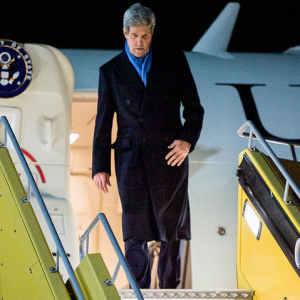The deadline for Iran to achieve a nuclear agreement with the international community is fast approaching, set for later this month. Over the past year, our nation’s diplomats along with global powers have been working tirelessly to produce an agreement that will prevent both an Iranian nuclear weapon and another war in the Middle East. Keeping Iran from acquiring a nuclear weapon is of central importance to American security – and achieving this through tough diplomacy is difficult, but very possible.
As an Army veteran and a former nuclear weapons officer stationed in Europe during the Cold War, I know all too well the sacrifice that may be required if diplomacy fails. For those of us who went to war as young men and women, we want only that our country do all it can diplomatically to keep our sons and daughters from returning to the battlefield. From a soldier’s perspective, fixing this relationship will go a long way towards keeping American military personal from returning to the Middle East. That is why the time to commit ourselves to diplomacy is now.
Until recently, Iran had been isolated from the world. Thanks to the aggressive sanctions regime supported by our allies around the world, Iran was forced to the negotiating table.
These negotiations have already yielded results. Iran’s nuclear program has been frozen for nearly a full year and with a robust international monitoring and verification regime in place, global partners have been able to keep an eye on Iran’s facilities, ensuring that no weapons grade fuel has been produced and that dangerous material was destroyed.
Congress helped get us where we are today with strong sanctions that the Administration enforced. This was a crucial part in a comprehensive strategy to get Iran to the table and a show of how American leadership should work.
But calls by some political leaders to enact additional sanctions now are shortsighted and counterproductive. Generally speaking, sanctions are used as a tool to get a state to the negotiating table. The goal of being at the table is to strike a deal. That’s where we are now.
Additionally, the talks have not been based on a “trust but verify” strategy. Since the U.S. expects Iran to try and cheat, verification has superseded trust. This is why the U.S. has based negotiations on constant monitoring of all elements of the nuclear program. With global powers acting together, the burden of proof remains on Iran. While the parties are still far apart on some key technical issues, both sides have incentives to come to an agreement that solves the Iran nuclear crisis through diplomacy, not war. If Iran cheats, the international community will act.
Unilateral moves by any of the negotiating parties, including the U.S., risks derailing these talks and the chance of preventing Iran from getting a nuclear weapon through diplomacy. Iran would likely kick out inspectors and resume the nuclear activities that have been frozen over the past year. If that happened, the U.S. could find itself back where we were last year: on the way to another war in the Middle East.
The best goal for diplomacy is an outcome that keeps America safe and nuclear weapons out of the hands of Iran. We are in the home stretch of a deal that could do just that, while keeping our nation safe and our men and women in uniform out of harm’s way. We must do everything we can to support that effort.

